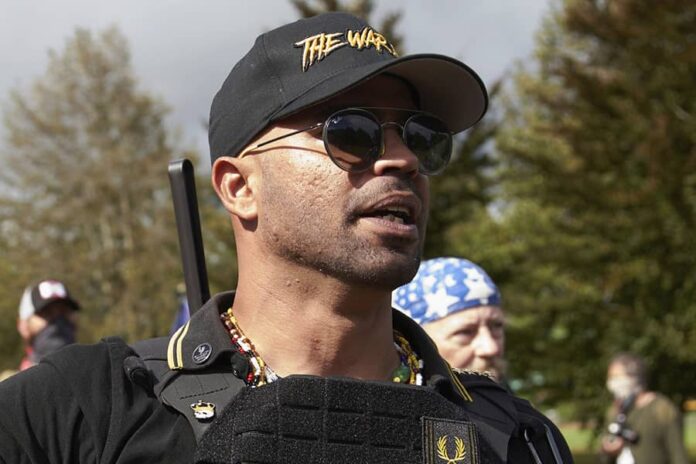Enrique Tarrio, serving 22 years for a Jan. 6 seditious conspiracy, crossed swords with prosecutors Thursday in a related criminal case.
Enrique Tarrio, clad in a green prison jumpsuit, stared intently at his interrogator.
“I don’t want to be in jail any longer,” the former leader of the far-right Proud Boys said, a hint of frustration and resignation in his voice.
It was, perhaps, the most obviously true thing Tarrio said Thursday from the witness stand in Washington’s federal court, where he was summoned to testify in the trial of a police officer accused of funneling him confidential information ahead of Jan. 6, 2021.
Tarrio’s return to the courthouse just across the street from the Capitol marked a dark reunion of sorts. Fourteen months ago, he was sentenced to 22 years in prison for organizing the vanguard of the mob that nearly derailed the transfer of power. His seditious conspiracy conviction was the high watermark for a Justice Department seeking to punish the ringleaders of the mob.
Now, Tarrio’s prosecutors — some of whom were in the courtroom observing his testimony — are awaiting the return of Donald Trump to the White House and wondering how much of their work he’ll erase with the stroke of a pen. Trump has pledged to pardon a host of Jan. 6 defendants, though it’s unclear if his clemency will extend to defendants who assaulted police or who, like Tarrio, faced serious felony charges as organizers of the attack.
Tarrio barely mentioned Trump during his four-hour stint as a defense witness for former D.C. police lieutenant Shane Lamond, a bit player in Tarrio’s blockbuster trial last year. But he carried himself with an air of grievance and defiance, someone who could sense the momentum in Washington already beginning to shift.
“I will not comment on that,” Tarrio said when Assistant U.S. Attorney Rebecca Ross asked if he knew whether Proud Boys traveled to Washington on Jan. 6, 2021. “This case is not a January 6th case.”
Tarrio said he’d invoke his Fifth Amendment rights if Ross pressed further, prompting U.S. District Judge Amy Berman Jackson to remind him that he had agreed a day earlier to waive those rights in order to testify on Lamond’s behalf. Jackson said if he continued to be recalcitrant she’d consider holding him in contempt.
“We’ll agree to disagree,” Tarrio responded coolly.
“You’re not in charge,” Jackson shot back.
In the back of the courtroom sat some of the Justice Department’s most prolific Jan. 6 prosecutors, including several who helped put Tarrio and his top Proud Boys allies in prison. FBI agents who testified against the men also filled the courtroom gallery. Tarrio repeatedly glared in their direction while testifying.
Lamond’s case is an offshoot of Tarrio’s. The longtime D.C. police officer is charged with obstruction of justice for feeding Tarrio details about the department’s effort to investigate Tarrio’s role in burning a Black Lives Matter banner after a pro-Trump march in December 2020. Tarrio was arrested for property destruction on Jan. 4, 2021, just after he flew back to Washington from his home in Miami.
Tarrio testified Thursday that he knew he would be arrested and had hoped to turn the moment into a “circus.” He said he arranged for two documentarians to be with him when he expected the arrest to occur and that he had planted stories with friendly reporters to ensure maximum exposure.
Prosecutors sought to show that Tarrio was an unreliable witness, suggesting he lied to friends and fellow Proud Boys about the details of the banner-burning case.
Tarrio acknowledged that he sometimes spread false messages to other Proud Boys and friends who he said had large social media followings. He described those lies as a “marketing ploy” and a chance to test messages with his group. Ross asked how the court could take his testimony seriously when he admitted lying to even his closest allies and had been convicted of seditious conspiracy in the very courthouse where they sat.
“I wasn’t convicted of perjury,” Tarrio shot back.
Tarrio seemed to relish his chance to do battle with prosecutors. He didn’t testify in his own criminal trial and appeared to treat Thursday’s appearance as a chance to settle old scores. For much of his cross-examination with Ross, Tarrio refused to acknowledge whether the text messages investigators obtained from his conversations with Lamond and others were authentic.
“I don’t want to be an asshole,” Tarrio said several times while refusing to answer her questions.
Left unsaid throughout the day was whether Tarrio, in fact, does expect some sort of clemency from Trump — either an outright pardon or a commutation of his 22-year sentence. Some Trump allies have pointed to the 22-year term as the prime example of the Justice Department’s excesses. Tarrio, after all, was not charged with being violent himself and was not even in Washington during the attack on the Capitol.
But in his trial, prosecutors characterized Tarrio as a cunning manipulator and charismatic leader who could motivate his followers to act. Though his arrest for burning the banner kept him away from Washington on Jan. 6, prosecutors said he remained in contact and in charge as his loyal allies led the way from the Washington monument to the foot of the building. Proud Boys were present at nearly every key breach point during the riot, helping overrun police lines and overtake the building.
On Thursday, prosecutors didn’t attempt to delve much into the details of the attack. But the former Proud Boys leader made clear he would have resisted if they did.
“I’m not,” he said, “answering anything for January 6th.”
By Kyle Cheney – Politico

